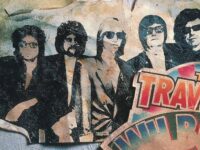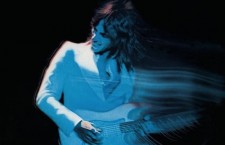Jeff Buckley is part of the spirit world of music. Along with a small, esoteric group of misfits and oracles that include Robert Johnson, Nick Drake, Billie Holiday and Jimi Hendrix, he seemed to have been born with one foot already rooted in the beyond, seemed to be already navigating worlds that shimmer past physics.
He possessed a chameleonic voice able to harness such singular and potent energies as Nina Simone, Edith Piaf and Nusrat Fateh Ali Kan. He did this so disarmingly that audiences could not help but be swept up in the invocation. This wasn’t mimicking; this was channeling. An otherworldly charge seemed present, lifting and harmonizing his voice – kindling fire from the hinterscapes of memory and experience.
Many will tell you this “otherworldly charge” was in fact located in his vocal chords.
Dream brother: Born on Nov. 17 1966, Jeff Buckley was raised Scotty Moorhead, only meeting his biological father, acclaimed folk artist Tim Buckley, once, at the age of eight. By his own account Buckley’s childhood was one of “rootless trailer trash,” but steeped in music.
His mother was a classically trained cellist, and stepfather Ron introduced him to the key ’70s rock and folk groups. Buckley later recalled that everyone in his family sang, and that he’d stumbled onto his first guitar in his Gran’s closet.
A voracious, near-promiscuous thirst for music led him to adore such wide-ranging, seemingly irreconcilable groups as kitsch rockers Kiss, hardcore punk outfit Bad Brains, Bob Dylan, Nusrat Fateh Ali Khan and Nina Simone. Earning his chops through playing guitar in a variety of punk, rock and funk bands, Buckley found his calling through solo performances, where he was free to bounce between genres and voicings.
His public singing debut and first major break came through a guest performance at a tribute concert for Tim Buckley, who had passed away at the age of 28, leaving behind an uneven but esteemed collection of folk, rock and more avant-garde musics.
By the time of Jeff Buckley’s residency at Manhattan’s Sin-e’, word was not so much getting round as spreading like wildfire. The likes of Robert Plant, Chrissie Hynde and Soundgarden’s Chris Cornell attended his shows, and began championing the phenomenon U2’s Bono would describe as “a pure drop in an ocean of noise.”
Says Cornell: “People talked about his concerts the way they used to talk about Hendrix. They’d sit there, wide-eyed, telling you stories about him. He definitely had an aura.”
A swan to sing: The grapevine electricity led to his debut studio album – 1994’s near-unanimously acclaimed Grace. David Bowie named it one of his 10 desert-island albums. Buckley assembled a touring band and hit the road for two years, a tour that had Led Zeppelin’s Jimmy Page to gush: “Technically, he was the best singer that had appeared probably in – I’m not being too liberal about this – if I say, in two decades.”
Following the tour, his band began laying down recordings for a follow-up, but the album would never be released. Buckley’s band was en route to Tennessee on May 29, 1997, to join him for re-recordings but by the time their flight had landed, Jeff Buckley was gone. He’d drowned during an impromptu night swim in the Mississippi river, after being caught in the wake of a passing boat. Jeff Buckley was 30.
The busker transformative: To experience a song by Buckley is to be seduced. Whether live or studio cut, an original song or an interpretation, a Jeff Buckley performance inevitably moves one, drawing or wrenching us into an often intense, always touching journey.
Buckley’s live appearances at Sin-e’ have become the stuff of legend. Armed with a lone electric guitar, he would casually announce a song, perhaps preambling with an anecdote, without raising his voice above the general chit-chat soundtracking the venue. Then he would strum into wonderment.
Anyone who has experienced his renditions of Holiday’s “Strange Fruit” or Leonard Cohen’s “Hallelujah” will be reduced to shivers as they read these words.
Nearly two decades later, in a world of quantum difference, he still inspires awe. John Legend: “I think I can sing with just about anybody, but he’s one of the few singers who truly intimidates me.”
[First published in Muse magazine.]
- How the Pixies Changed Everything With ‘Surfer Rosa’ - July 12, 2023
- Frank Zappa – ‘Funky Nothingness’ (2023) - June 30, 2023
- How Jim White’s ‘Wrong-Eyed Jesus!’ Changed My Mind About Country Music - June 14, 2023




